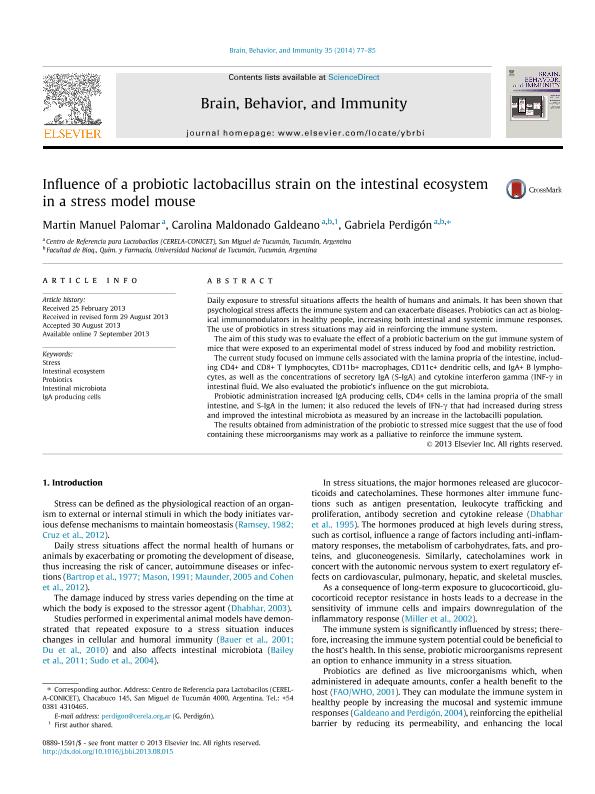Mostrar el registro sencillo del ítem
dc.contributor.author
Palomar, Martín Manuel

dc.contributor.author
Maldonado Galdeano, María Carolina

dc.contributor.author
Perdigón, Gabriela del Valle

dc.date.available
2015-10-26T17:49:41Z
dc.date.issued
2014-01
dc.identifier.citation
Palomar, Martín Manuel; Maldonado Galdeano, María Carolina; Perdigón, Gabriela del Valle; Influence of a probiotic lactobacillus strain on the intestinal ecosystem in a stress model mouse; Academic Press Inc Elsevier Science; Brain Behavior And Immunity; 35; 1-2014; 77-85
dc.identifier.issn
0889-1591
dc.identifier.uri
http://hdl.handle.net/11336/2564
dc.description.abstract
Daily exposure to stressful situations affects the health of humans and animals. It has been shown that psychological stress affects the immune system and can exacerbate diseases. Probiotics can act as biological immunomodulators in healthy people, increasing both intestinal and systemic immune responses. The use of probiotics in stress situations may aid in reinforcing the immune system. The aim of this study was to evaluate the effect of a probiotic bacterium on the gut immune system of mice that were exposed to an experimental model of stress induced by food and mobility restriction. The current study focused on immune cells associated with the lamina propria of the intestine, including CD4+ and CD8+ T lymphocytes, CD11b+ macrophages, CD11c+ dendritic cells, and IgA+ B lymphocytes, as well as the concentrations of secretory IgA (S-IgA) and cytokine interferon gamma (INF-c in intestinal fluid. We also evaluated the probiotic?s influence on the gut microbiota. Probiotic administration increased IgA producing cells, CD4+ cells in the lamina propria of the small intestine, and S-IgA in the lumen; it also reduced the levels of IFN-c that had increased during stress and improved the intestinal microbiota as measured by an increase in the lactobacilli population. The results obtained from administration of the probiotic to stressed mice suggest that the use of food containing these microorganisms may work as a palliative to reinforce the immune system.
dc.format
application/pdf
dc.language.iso
eng
dc.publisher
Academic Press Inc Elsevier Science

dc.rights
info:eu-repo/semantics/openAccess
dc.rights.uri
https://creativecommons.org/licenses/by-nc-sa/2.5/ar/
dc.subject
IGA PRODUCING CELLS
dc.subject
INTESTINAL ECOSYSTEM
dc.subject
INTESTINAL MICROBIOTA
dc.subject
PROBIOTICS
dc.subject
STRESS
dc.subject.classification
Inmunología

dc.subject.classification
Medicina Básica

dc.subject.classification
CIENCIAS MÉDICAS Y DE LA SALUD

dc.title
Influence of a probiotic lactobacillus strain on the intestinal ecosystem in a stress model mouse
dc.type
info:eu-repo/semantics/article
dc.type
info:ar-repo/semantics/artículo
dc.type
info:eu-repo/semantics/publishedVersion
dc.date.updated
2016-03-30 10:35:44.97925-03
dc.identifier.eissn
1090-2139
dc.journal.volume
35
dc.journal.pagination
77-85
dc.journal.pais
Estados Unidos

dc.journal.ciudad
San Diego
dc.description.fil
Fil: Palomar, Martín Manuel. Consejo Nacional de Investigaciones Científicas y Técnicas. Centro Científico Tecnológico Tucumán. Centro de Referencia para Lactobacilos (i); Argentina
dc.description.fil
Fil: Maldonado Galdeano, María Carolina. Consejo Nacional de Investigaciones Científicas y Técnicas. Centro Científico Tecnológico Tucumán. Centro de Referencia para Lactobacilos (i); Argentina. Universidad Nacional de Tucuman. Facultad de Bioquimica, Quimica y Farmacia. Instituto de Microbiologia; Argentina
dc.description.fil
Fil: Perdigón, Gabriela del Valle. Consejo Nacional de Investigaciones Científicas y Técnicas. Centro Científico Tecnológico Tucumán. Centro de Referencia para Lactobacilos (i); Argentina. Universidad Nacional de Tucuman. Facultad de Bioquimica, Quimica y Farmacia. Instituto de Microbiologia; Argentina
dc.journal.title
Brain Behavior And Immunity

dc.relation.alternativeid
info:eu-repo/semantics/altIdentifier/url/https://www.sciencedirect.com/science/article/abs/pii/S0889159113004492
dc.relation.alternativeid
info:eu-repo/semantics/altIdentifier/doi/http://dx.doi.org/10.1016/j.bbi.2013.08.015
Archivos asociados
